Kiss me, gentlemen
Saturday 7 June 2014, 6:00pm
Bloc Projects
71 Eyre Lane
Sheffield S1 4RB
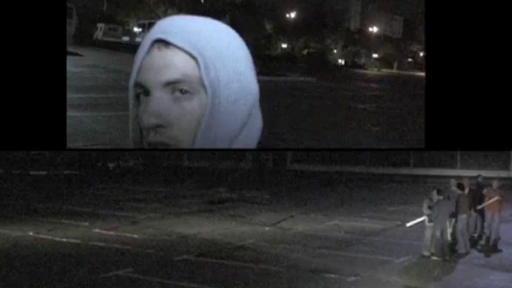
If there is something about the act of filming like a type of judicial power, then that may make us, the viewers, spectating executioners in collusion with the filmmaker.
Kiss me, gentlemen borrows its title from Foucault’s Discipline and Punish, which recounts the story of a public execution by quartering in 1756, France. ‘Kiss me, gentlemen’ is the condemned man’s last spoken request to the confessors.
Our bodies belong to others; parents first, then lovers. A mother’s body belongs to her child. We are subjected to education systems and our drives for consumption demand to be satisfied through contracts of labour. Our bodies belong to institutions; institutions for criminals, the sick, and the insane. Institutions in the end too, for all of us, via the medical, care, and funerary systems.
When we agree to participate in documentaries, our bodies belong to the filmmaker. An implicit agreement made explicit through the use of release forms. A contractual agreement places the image, sound, and expression – and by metaphorical extension – the body, in the ownership of the filmmaker. The care of which is entangled with the politics, the ideologies of filmic history and filmic experience. The filmmaker too is invested with his or her body, navigating space, time, movement, and the “contaminated projections” of his or her own ideologies. It’s a subtle network of relations unfolding. And as we watch carefully or repeatedly, we might find our knowledge ruptured, our feelings disturbed.
In one way or another all the films in this programme deal with the mechanisms and technologies of entrapment – the destitute body, the incarcerated body, the body as a self-replicating system, bodies of soldiers affected by military rituals leaving an imprint long after having served. But altogether it’s a programme that also wants to question filmic entrapment and the predicament of being a spectator.
Whilst some films offer significant critique of institutional power and the assumed political agency of the documentary medium – and by extension of the documentary filmmaker, others inject humour, incite horror, or straddle precariously on the ethical tightrope of representation. Yet all point powerfully towards the condition of embodied subjects that have become specular, schizoid, internally disjointed. – Minou Norouzi
Selected by Minou Norouzi, filmmaker and programmer, doctoral candidate at Goldsmiths, University of London. minounorouzi.com
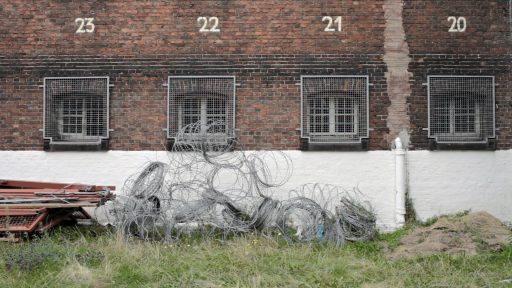
Von der Ordnung der Gesellschaft / Of the Order of Society | Alexander Lorenz | Germany 2013 | Video | 12 min 30s
Shot in a prison located in Düsseldorf, Germany, inaugurated in 1893, and considered modern in its day the filmmaker gained remarkable access to the now abandoned site. With all locks and technical installations removed, Of the Order of Society was filmed whilst accompanied by a voluntary guide, an ex-warden who used to work in that very prison. Shot formally to reflect the architecture of the space, the film is set to an adapted text from German Penal Law. Replacing the words “inmates” with “citizens”, and “prison” or “institution” with “society” affects greatly in extending from ‘inside’ the penal system to ‘outside’, society in general. The complete absence of human bodies may evoke projected reflections on day-to-day power relations. – MN
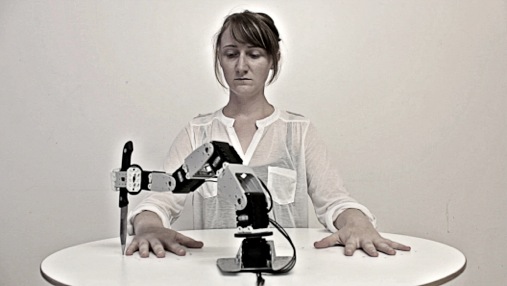
to stab | Nelmarie du Preez | UK 2013 | HD | 45s
For this work the artist established a ‘collective’ named ‘Du Preez/Gui’ between herself and her computer, where they stand as equal actors in a performance-based artistic collaboration. This work asks how a human-computer relationship might be useful in revealing questions with regards to ‘the self’ constituted by ‘the other’ in the mapping of relation. With the documented performance ‘to stab’, which forms part of the series ‘Loops of Relation’ (2013), the encounters and collisions between these two ‘bodies’ are presented, showcasing the fragility of relation.

Complex | Daniel Mann and Sirah Foighel Brutmann & Eitan Efrat | Israel 2008 | Video | 9 min
On a rainy night, a group of young men slowly assemble in a dark parking lot. One by one they appear, greeted by a mutual hug, invoking the intimacy they once shared during their three-year service at the IDF ‘special forces’. Soon, their attention shifts to the concrete lot, where they find a sketch outlining the walls and niches of a contingent building. Equipped with cardboard cylinders to be held as guns, they are requested to “takeover” the ‘house’ with the techniques they exercised so thoroughly during their service. Resuming their combat positions, they meticulously plan the ‘raid’ before going into action.
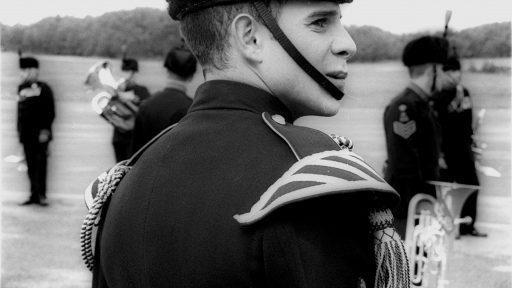
Tattoo | Miranda Pennell | UK 2001 | Video | 9 min
Trees, insects and birds look-on, as the countryside is invaded by a lost regiment of soldiers engaged in a repetitive display.
The ritual of military drill is by turns absurd and sinister. The soldiers of the Light Division perform a choreography that has been perfected and aestheticized in order to serve a function: to be effective. That is, the dual function of transforming many bodies into a single body, and of mesmerizing onlookers with their ‘stunning’ unity.
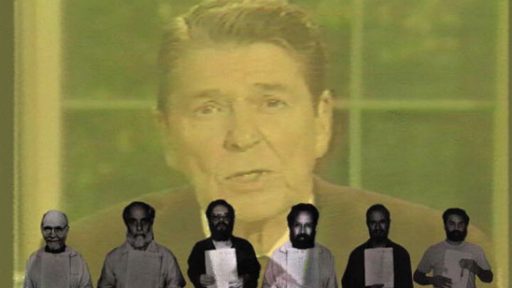
Hostage: The Bachar Tapes | Walid Raad | Lebanon/USA 2002 | Video | 16 min
Hostage: The Bachar Tapes is an experimental videotape about “The Western Hostage Crisis”. The crisis refers to the abduction and detention in Lebanon in the 1980s and early 1990s of western men like Terry Anderson and Terry Eaite by “Islamic militants”. This episode directly and indirectly consumed Lebanese, US, French and British political and public life, and precipitated a number of high profile political scandals like the Iran-Contra affair in the US.
In Hostage: The Bachar Tapes (English version) the “Western Hostage Crisis” is examined through the imaginary testimony of Souheil Bachar. Souheil Bachar was held hostage in Lebanon between 1983 and 1993. What is remarkable about Souheil’s captivity is that he was the only Arab man to have been detained with the western hostages kidnapped in Beirut in the 1980s. In fact, Souheil was held for 3 months in 1985 in the same cell as five American men: Terry Anderson, Thoma Sutherland, Benjamin Weir, Marting Jenco and David Jacobson. – The Atlas Group. Courtesy of Anthony Reynolds, London
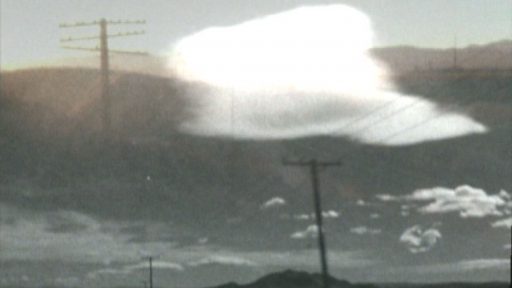
Three Poems by Spoon Jackson | Michel Wenzer | Sweden 2003 | Video | 14 min
A poetic short film in three parts about Spoon Jackson – a man who has spent 25 years in prison. It is through poetry that he survives. A moving film that blends imagery with Spoon’s poetry recited over the phone. Voice and words: Spoon Jackson; poet, writer and actor, born in 1958 in California, USA. Sentenced to life imprisonment in 1977. Courtesy of Filmform
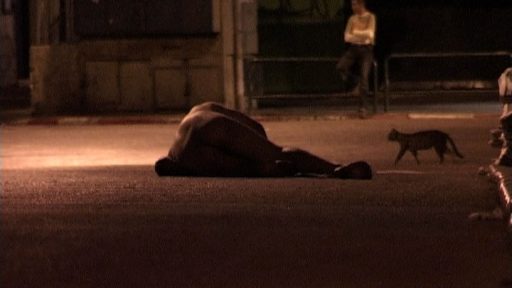
Arcadia, downtown | Yaron Lapid | Israel 2008 | Video | 15 min
Filmed in the lower depths of a Tel Aviv downtown, a naked man, drugged, bangs his head against concrete walls as he staggers and falls, trying aimlessly to regain control of his own body. The naked man, in his most degraded state, is observed by a local prostitute who tries to get help for him. His identity is not clear. What is he a victim of? The prostitute tells the camera her ordeal as she comes to his aid. Her intervention makes us shift our sympathies and emotional focus constantly.
In this dark piece the artist interrogates a variety of issues, from the performance of bodies through storytelling to the camera’s ability to show simultaneously raw and performative acts and behaviours. As the viewer becomes a performer, the film also explores the question of the film-maker as voyeur. – Julia Pascal